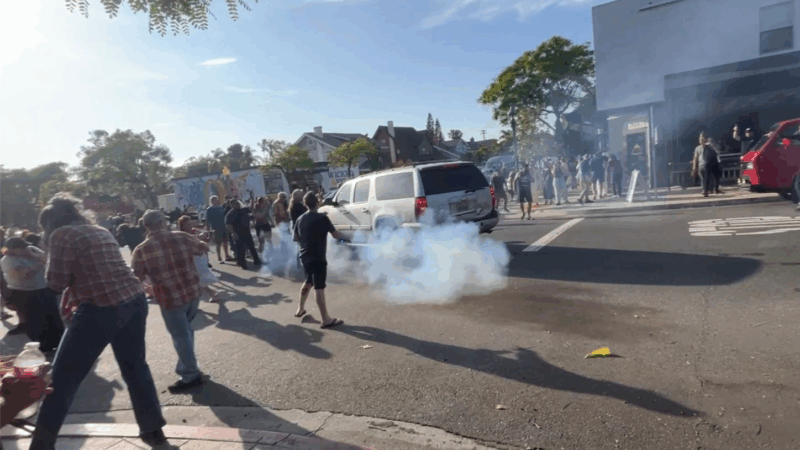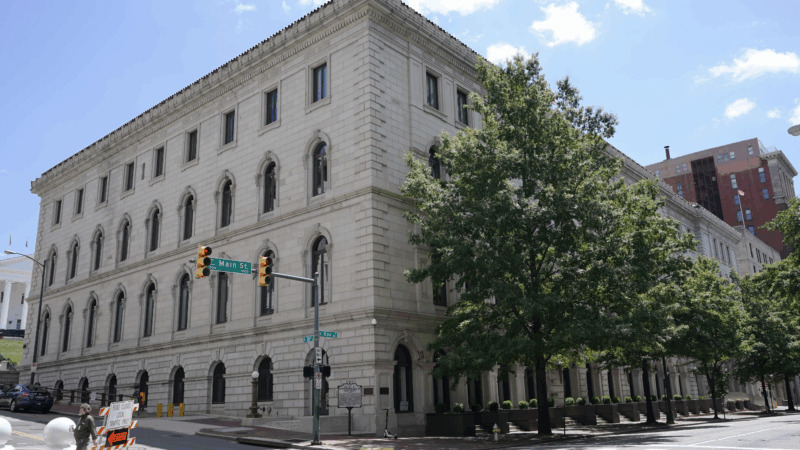ICE raids grow tense as protesters confront immigration agents
Over the past several days, U.S. Immigration and Customs Enforcement agents around the country have contended with angry crowds protesting their actions in cities from Minneapolis to Chicago to Los Angeles. This most recent spate of encounters has become heated.
“It got out of control because of the way that they showed up,” says San Diego council member Sean Elo-Rivera, referring to ICE agents conducting a raid on a local Italian restaurant. Members of the public surged around the agents, at one point surrounding their cars. The immigration authorities discharged flash-bangs, leading to a chaotic scene.
Elo-Rivera posted a photo of federal agents dressed in tactical gear outside the restaurant, with the word “TERRORISTS” written over it. It drew an angry reaction from the Trump administration, but he says he believes the operation was meant to be intimidating.
“They wanted to make a show of it, so they did it on Friday night at dinnertime. They wanted to make a show of this so they showed up with assault rifles. They wanted to make a show of this so they showed up in far more numbers than they needed to,” Elo-Rivera says. “And the use of masks I think is incredibly concerning.”
ICE agents, as well as other federal agents delegated to work with ICE, are increasingly wearing masks during operations, something many people find objectionable. But at a press conference on Monday, ICE Acting Director Todd Lyons said agents had good reasons to do so.
“People are out there taking photos of [agents’] names, their faces and posting them online with death threats to their family and themselves,” Lyons says. “So I’m sorry if people are offended by them wearing masks, but I’m not going to let my officers and agents go out there and put their lives on the line and their family on the line because people don’t like what immigration enforcement is.”
At the same press conference, Homeland Security Investigations Special Agent in Charge for New England Michael Krol cautioned those who “impede or obstruct operations or those who dare to threaten or assault our law enforcement officers,” and he warned of potential investigations and prosecutions.
But civil rights groups say bystanders have the right to observe, protest and shout questions. Kate Evans, director of the Immigrant Rights Clinic at Duke Law, says ICE agents don’t necessarily have to answer questions from bystanders, but those questions can still be important.
“They’re essentially functioning as kind of Fourth Amendment observers and informing the people who are actually the subject of the seizure — the arrest — that they have the right to request a warrant,” Evans says.

She says one thing an observer can point out is that ICE agents need to show a judicial warrant — one signed by a judge, not just an ICE official — in order to enter a private space without permission.
Agents have more latitude in public spaces. Evans says in order to arrest someone on civil immigration violations, agents should generally have an administrative warrant — the kind signed by ICE itself — showing the reason for the arrest. But in some circumstances, she says agents may also arrest someone if they have probable cause and reason to believe the person will get away.
“Immigration laws and regulations are not easily accessible for a lay person,” Evans says.
Adding to the confusion is the fact that sometimes, when ICE agents are spotted on operations, they’re actually part of larger criminal investigations. That appears to have been the case in Minneapolis on Tuesday, when a crowd came out to protest what many assumed was an immigration raid at a taco restaurant, chanting “Abolish ICE!” Later, federal officials said it was a criminal investigation.
“The thing is, if you don’t want to confuse people, why would you send ICE agents to the scene?” asks Ryan Perez, who joined the crowd. Perez works with a nonprofit called COPAL, which trains “constitutional observers” to monitor ICE raids. Perez says the group is cautious, because sometimes people will mistakenly issue false alarms about ICE raids that are actually other kinds of law enforcement operations.
At the same time, he says you have to understand people’s response when heavily-armed ICE agents appear on the street.
“They intentionally brought armored vehicles in a residential area and a business corridor in front of, like, very high traffic areas. That’s a stunt to me,” Perez says of the operation on Tuesday. “It just reminded me of the protests and the reactions of officers post-George Floyd. It brought me back to that moment.”
Annual governors’ gathering with White House unraveling after Trump excludes Democrats
An annual meeting of the nation's governors that has long served as a rare bipartisan gathering is unraveling after President Donald Trump excluded Democratic governors from White House events.
Federal judge acknowledges ‘abusive workplace’ in court order
The order did not identify the judge in question but two sources familiar with the process told NPR it is U.S. District Judge Lydia Kay Griggsby, a Biden appointee.
Top 5 takeaways from the House immigration oversight hearing
The hearing underscored how deeply divided Republicans and Democrats remain on top-level changes to immigration enforcement in the wake of the shootings of two U.S. citizens.
Snowboarder Chloe Kim is chasing an Olympic gold three-peat with a torn labrum
At 25, Chloe Kim could become the first halfpipe snowboarder to win three consecutive Olympic golds.
Pakistan-Afghanistan border closures paralyze trade along a key route
Trucks have been stuck at the closed border since October. Both countries are facing economic losses with no end in sight. The Taliban also banned all Pakistani pharmaceutical imports to Afghanistan.
Malinowski concedes to Mejia in Democratic House special primary in New Jersey
With the race still too close to call, former congressman Tom Malinowski conceded to challenger Analilia Mejia in a Democratic primary to replace the seat vacated by New Jersey Gov. Mikie Sherrill.





